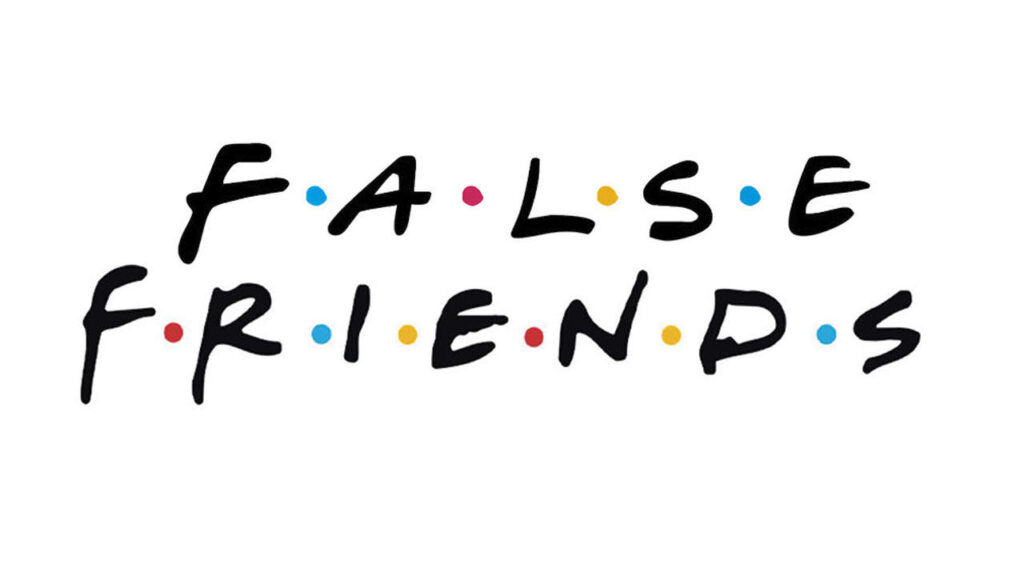Learning English is an exciting and enriching experience, but it is also full of challenges. One of the biggest challenges for Spanish speakers are the so-called false friends, those words that look very similar in both languages but actually have different meanings. These “linguistic traps” can lead to confusing or even amusing situations if not used correctly.
1. What are False friends?
The false friends are words in two languages that look similar in written or spoken form, but have different meanings. The confusion often arises because students, when they see a similar word, assume it means the same in both languages.
For example, the English word actual and the Spanish word actual are a typical case of false friends. Although they look identical, actual in English means “real” or “true”, while in Spanish it means “from the present”.
2. The most common false friends
Here are some of the most common false friends between English and Spanish:
a) Actual vs. Actual
- In English: Actual means “real” or “true”.
- Example: What is the actual price?
(What is the real price?)
- Example: What is the actual price?
- In Spanish: It refers to something “from the present moment”.
- Example: “The current situation is complicated.”
b) Librería vs. Library
- In English: Library means “library”.
- Example: I borrowed this book from the library.
(I borrowed this book from the library.)
- Example: I borrowed this book from the library.
- In Spanish: Librería is a store where books are sold.
- Example: “I’m going to the bookstore to buy a book.”
c) Embarazada vs. Embarrassed
- In English: Embarrassed means “ashamed”.
- Example: She felt embarrassed when she made the mistake.
(She felt embarrassed when she made the mistake.)
- Example: She felt embarrassed when she made the mistake.
- In Spanish: Embarazada means “pregnant”.
- Example: “She is five months pregnant.”
d) Constipated vs. Constipado
- In English: Constipated means “constipated” or “having constipation”.
- Example: I feel constipated after eating too much bread.
(I feel constipated after eating too much bread.)
- Example: I feel constipated after eating too much bread.
- In Spanish: Constipado means “cold” (illness).
- Example: “I have a cold and can’t breathe well.”
e) Sensible vs. Sensible
- In English: Sensible means “reasonable” or “practical”.
- Example: That’s a sensible idea.
(That’s a reasonable idea.)
- Example: That’s a sensible idea.
- In Spanish: Sensible means “emotional” or “sensitive”.
- Example: “She’s very sensitive and gets emotional easily.”
f) Carpet vs. Carpeta
- In English: Carpet means “rug” or “carpet”.
- Example: There’s a stain on the carpet.
(There’s a stain on the carpet.)
- Example: There’s a stain on the carpet.
- In Spanish: Carpeta means “folder” or “file holder”.
- Example: “Put the papers in the red folder.”
g) Assist vs. Asistir
- In English: Assist means “to help”.
- Example: Can you assist me with this project?
(Can you help me with this project?)
- Example: Can you assist me with this project?
- In Spanish: Asistir means “to attend” or “to be present”.
- Example: “I’m going to attend the meeting tomorrow.”
h) Fabric vs. Fábrica
- In English: Fabric means “cloth” or “material”.
- Example: This dress is made of high-quality fabric.
(This dress is made of high-quality fabric.)
- Example: This dress is made of high-quality fabric.
- In Spanish: Fábrica means “factory”.
- Example: “The car factory will close this year.”

3. Why do false friends occur?
Most false friends exist due to the evolution of language. English and Spanish share common roots in Latin, but over time, the meanings of certain words changed in one or both languages. This can be especially confusing for students, as many terms do maintain the same meaning, which reinforces the mistaken idea that all similar words are equivalent.
4. Tips to avoid falling into the trap of false friends
- Always check the context: Don’t be misled by the appearance of a word. Review how it is used in the sentence.
- Use bilingual and monolingual dictionaries: These tools are key to confirming meanings and avoiding confusion.
- Make lists of false friends: Spend time learning the most common words that cause confusion.
- Practice with real examples: Use the words in sentences that help you remember their correct meanings.
- Ask your teachers: If you have doubts, ask. In our academy, our standard courses and intensive courses include practical explanations to overcome these difficulties.
5. Turning false friands into your allies
Although false friends may seem like an obstacle, they are also an opportunity to learn. Once you recognize them and understand their real meanings, your confidence and fluency in the language will increase.
False friends are one of the most common traps when learning English, but with practice and the right guidance, you can master them. At our language academy, we help you overcome these challenges with practical methods and exercises that prepare you to use them correctly in real life.
Don’t let false friends fool you! Take a step forward in your Espanish learning journey and turn them into a tool to grow your command of the language.
